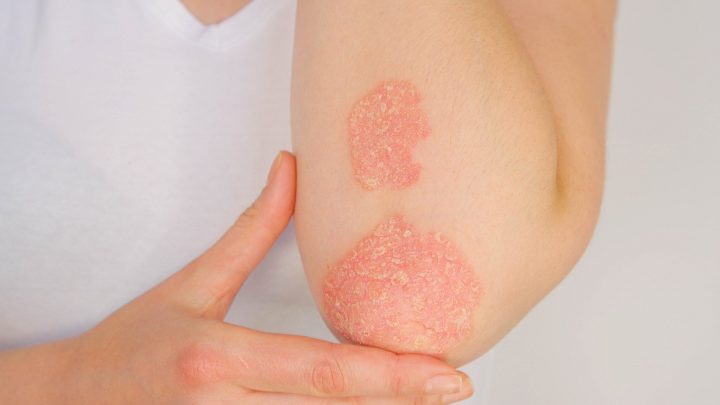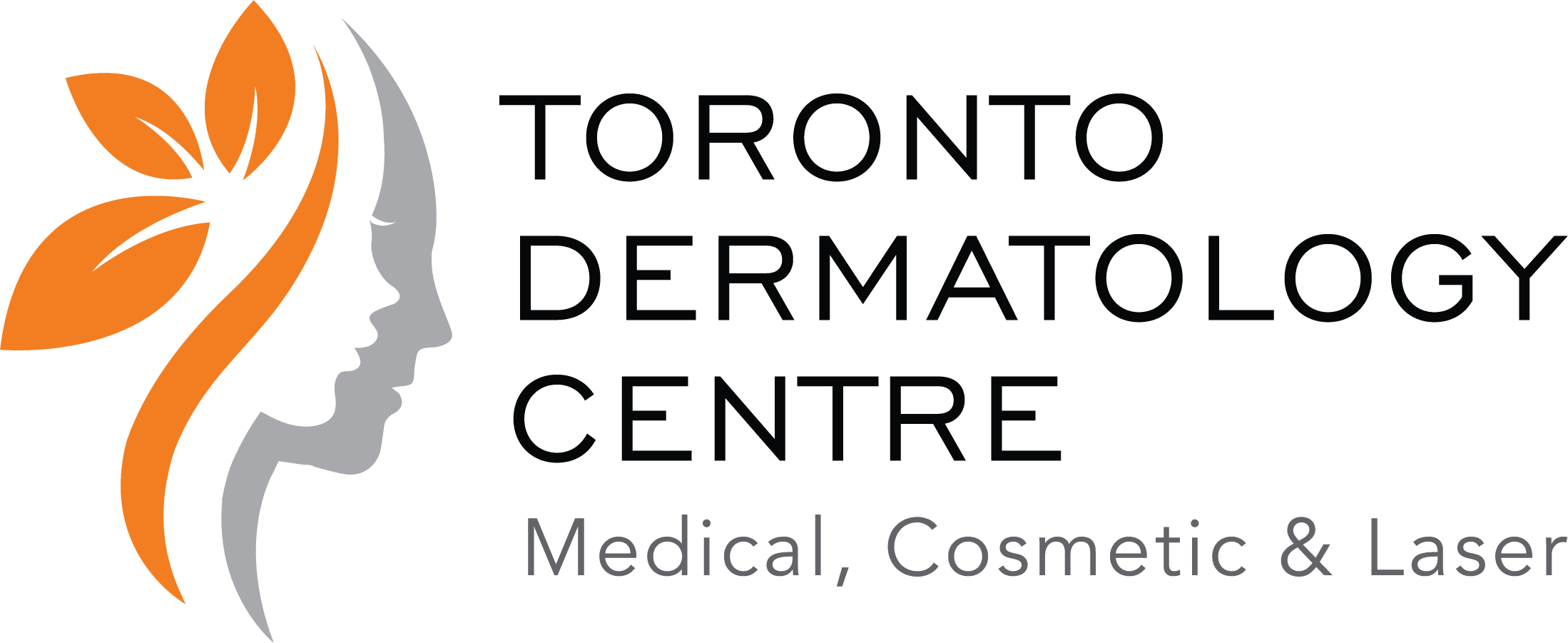Toronto Dermatology Centre is one of the premiere places in Canada to manage psoriasis; we launched the Toronto Psoriasis Centre because we see so many patients with psoriasis and have become a centre of excellence for psoriasis. Both Dr. Benjamin Barankin and Dr. Anatoli Freiman have published and presented around the world on the management of psoriasis.
Toronto Psoriasis Centre has outstanding dermatologists that can offer both a comprehensive assessment and diagnosis of your skin, and also discuss all the treatment options including: moisturizer selection, vitamin and natural therapies, prescription creams and pills (e.g. methotrexate, soriatane, cyclosporine, Otezla®, Sotyktu®), and the newer and very effective biologic agents (e.g. Enbrel®, Humira®, Cimzia®, Stelara®, Cosentyx®, Siliq®, Bimzelx®, Skyrizi®, Ilumya® and Tremfya®).
As well, at our Toronto dermatology clinic, we offer clinical trials – please email [email protected] or call us at 416-633-0001 x4 if you are interested in participating in clinical trials and furthering our understanding of psoriasis while getting access to the most cutting-edge treatments.
Psoriasis affects 2-3% of people in North America. Psoriasis is a persistent skin disorder characterized by red, thickened areas with silvery scales, most often on the scalp, elbows, knees, and lower back. Some cases of psoriasis are so mild that people don’t know they have it. Severe psoriasis may cover large areas of the body. Psoriasis is not contagious and cannot be passed from one person to another, but it is most likely to occur in members of the same family.
What Causes Psoriasis?
The cause of psoriasis is unknown. However, recent discoveries point to an abnormality in the functioning of special white cells (T cells) which trigger inflammation and the immune response in the skin. Because of the inflammation, the skin grows too rapidly. Normally, the skin replaces itself in about 30 days, but in psoriasis, the process speeds up and replaces the skin in 3-4 days, and the signs of psoriasis develop (thickness and scaling).
People often notice new spots 10 to 14 days after the skin is cut, scratched, rubbed, or severely sunburned (Koebner phenomenon). Psoriasis can also be activated by infections, such as strep throat, and by certain medicines (beta blockers, lithium, etc.). Flare-ups sometimes occur in the winter, as a result of dry skin and lack of sunlight. Winters in Canada can be particularly harsh for patients with psoriasis especially during the winter times.
Types of Psoriasis
Psoriasis comes in many forms. Each differs in severity, duration, location, shape, and pattern of the scales. The most common form of psoriasis is called plaque psoriasis and it begins with little red bumps. Gradually, these bumps become larger, and scales form. While the top scales flake off easily and often, scales below the surface stick together. These small red areas can enlarge.
- Scalp, elbows, knees, legs, arms, genitals, nails, palms, and soles are the areas most commonly affected by psoriasis. It will often appear in the same place on both sides of the body.
- Scalp psoriasis may be mistaken for dandruff, or both can sometime co-exist.
- Nails with psoriasis frequently have tiny pits and often lift (onycholysis). Nails may thicken or crumble, and are difficult to treat. Fungal infections are more common in patients with nail psoriasis. Toronto Dermatology Centre can help you determine whether you have simply psoriasis in your nails or an actual fungal infection.
- Inverse psoriasis occurs in the armpits, under the breasts, and in skin folds around the groin, buttocks, and genitals.
- Guttate (“drop like”) psoriasis usually affects children and young adults. Typically it begins after a sore throat (e.g. Strep throat) with many small, red, scaly spots appearing on the skin. Guttate psoriasis frequently clears up by itself in a few months
- 20-30% of people with psoriasis may have symptoms of arthritis (“psoriatic arthritis”) and should consider seeing a rheumatologist. If you have swelling, aching or pain in your joints, or your joints feel sore for the first 30-60min in the morning before “loosening up,” make sure to mention this to your dermatologist.
How is Psoriasis Diagnosed?
Dermatologists diagnose psoriasis by taking a thorough history and examining the skin, nails, and scalp. If the diagnosis is in doubt, a skin biopsy may be helpful.

How is Psoriasis Treated?
The goal of psoriasis treatment is to reduce inflammation and to control shedding of the skin. Moisturizing creams loosen scales and help control itching. Special diets have not been successful in treating psoriasis, except in isolated cases; increasing fish in the diet may benefit some patients with psoriasis and a low glycemic diet is likely of some benefit. Toronto Dermatology Centre is cutting edge as far as understanding all the medical treatment options as well as the more natural options for psoriasis. treatment. Scientific studies now also suggest improvement in psoriasis with weight reduction and stopping smoking.
Psoriasis treatment is based on a patient’s health, age, lifestyle, and the severity of the psoriasis. We will evaluate your psoriasis on an individual basis and give you the optimal treatment plan for you. Different types of treatments and several visits to your dermatologist may be needed.
Our specialist physicians at Toronto Psoriasis Centre may prescribe medications to apply on the skin containing cortisone compounds (e.g. clobetasol, fluocinonide, betamethasone), combination products (eg. Duobrii lotion®, Dovobet® gel/ointment, Enstilar® foam, Diprosalic lotion/ointment), topical immunomodulatory creams and ointments (eg. Protopic®, Elidel®, Eucrisa® and Zoryve®), and less commonly retinoids (eg. Tazorac®), synthetic vitamin D analogues (eg. Dovonex®, Silkis®), or tar for your psoriasis. For scalp psoriasis, we’ve had good success with Sebcur-T shampoo, as well as the prescription shampoo Clobex®. These psoriasis treatments may be used in combination with natural sunlight or biologics. An oral or injectable medications (biologic) treatment.
Sunlight exposure helps the majority of people with psoriasis but it must be used cautiously.
Types of Treatment
Cortisone is a medication that reduces inflammation. Cortisone creams, ointments, and lotions may clear the skin temporarily and control the condition in many patients. Weaker preparations should be used on more sensitive areas of the body such as the genitals and face. Stronger preparations will usually be needed to control lesions on the scalp, elbows, knees, palms, soles, and parts of the torso. Side effects of the stronger cortisone preparations (if misused) include thinning of the skin, dilated blood vessels, bruising, and skin color changes. Stopping these medications suddenly may result in a flare-up of the disease. Occasionally, the psoriasis may become resistant to the steroid preparations. Your dermatologist may inject cortisone in difficult-to-treat spots. Non-steroid anti-inflammatory creams such as Protopic® (tacrolimus) and Elidel® (pimecrolimus), or Zoryve® can be quite helpful in delicate/thin-skin areas such as in the groin, armpits, and face.
Sunlight and ultraviolet light slow the rapid growth of skin cells in psoriasis. Although ultraviolet light or sunlight can cause skin wrinkling, eye damage, and skin cancer, light treatment (“phototherapy”) using narrow-band UVB is safe and effective under a dermatologist’s care. There are a few private clinics that offer this, as well as Women’s College Hospital and Toronto Western Hospital.
This is an oral anti-cancer drug that can improve psoriasis when other treatments have failed; it is also useful in psoriatic arthritis. Because it can cause side effects such as impairing the liver, regular blood tests are performed and periodic visits to your dermatologist are required. Other side effects include fatigue, upset stomach, nausea, and dizziness. Methotrexate should not be used by pregnant women, or by men and women who are trying to conceive a child. Alcoholic beverages should not be consumed if using methotrexate. Methotrexate is take once per week only, and the remaining days Folic acid is taken to minimize side effects and risks.
Prescription oral vitamin A-related drugs (e.g. Soriatane®) may be prescribed alone or in combination with ultraviolet light for severe cases of psoriasis (along with topical therapy in most cases). Side effects include dryness of the skin, lips, and eyes; elevation of fat levels in the blood (cholesterol and triglycerides). Oral retinoids are not commonly used in women of child-bearing age due to effects on a fetus. Occasional blood tests are required and periodic visits with your dermatologist.
This is a newer oral medication (anti-inflammatory) which is a very safe and effective option for psoriasis. Hand/foot (palmoplantar) psoriasis does particularly well with this medication, and nails improve as with other systemic therapies. This treatment is also effective for psoriatic arthritis. There is no monitoring required with this medication which speaks to the safety. The main side effect is loose stools, nausea, diarrhea, and headaches, which typically may occur in the first few weeks and then resolves. A newer pill option is Deucravacitinib (Sotyktu®).
Etanercept (Enbrel®), Adalimumab (Humira®), Certolizumab (Cimzia®), Ustekinumab (Stelara®), Secukinumab (Cosentyx®), Brodalumab (Siliq®), Bimekizumab (Bimzelx®), Risankizumab (Skyrizi®), Tildrakizumab (Ilumya®) and Guselkumab (Tremfya®) are very safe & effective agents for psoriasis and psoriatic arthritis, and are typically administered by self-injection subcutaneously in varying frequencies. Some of these agents are administered once or twice a week, while others are administered every 1-3 months. The vast majority of patients find these medications very convenient and the discomfort of the injection to be quite minimal. There is also now Deucravacitinib (Sotyktu®) which is an oral pill option.
These agents have been safely and effectively used in millions of people worldwide for other inflammatory conditions as well, including: rheumatoid arthritis, Crohn’s disease, ulcerative colitis and ankylosing spondylitis.
When topical (lotion/cream/ointment) therapy is not practical or not effective enough, and the psoriasis too widespread, and/or in the presence of psoriatic arthritis, biologic agents should be strongly considered; they are typically prescribed by a dermatologist rather than by a family physician/general practitioner.
These agents have revolutionized the treatment of moderate-severe plaque psoriasis therapy as these treatments are considered both safe and highly effective; although there are potential side effects to these medications like all medications, with proper counselling and periodic blood tests and periodic visits to the dermatologist, these therapies can be an excellent treatment option for many patients struggling with psoriasis. Toronto Dermatology Centre is dedicated to minimizing the physical and psychosocial impact of psoriasis through a variety of treatment options and counselling.
The main drawback to the psoriasis biologics is their high-cost, and fortunately most third party (e.g. work) insurance will pay for these medications. There are also instances of coverage under ODB/social assistance and for seniors. In cases where a biologic medication is indicated for psoriasis but the cost is not covered for the medication by a drug or government plan, at the Toronto Dermatology Centre we offer clinical research trials in psoriasis which allows many patients to obtain psoriasis medications for free. Speak with one of our physicians to decide the best treatment plan for your psoriasis.
Here is a selection of scientific & media articles quoting our renowned dermatologists as they pertain to psoriasis. Toronto Dermatology Centre is proud to be among the largest & most comprehensive treatment centres for psoriasis in Canada.
Toronto Dermatology Centre is located in Toronto, Ontario, and serves men and women in North York, Markham, Vaughan, Richmond Hill, York, Aurora, Thornhill, Mississauga, Etobicoke, Scarborough, Pickering, Peterborough, Guelph, Kitchener, Waterloo, Hamilton, Burlington, Ajax, Oshawa, Barrie, downtown, midtown, uptown and all of Greater Toronto (GTA).
Thinking of visiting Toronto’s premier skin clinic soon?
Fill out the inquiry form below and let us know your area of interest.
Call us today @ 416.633.0001
